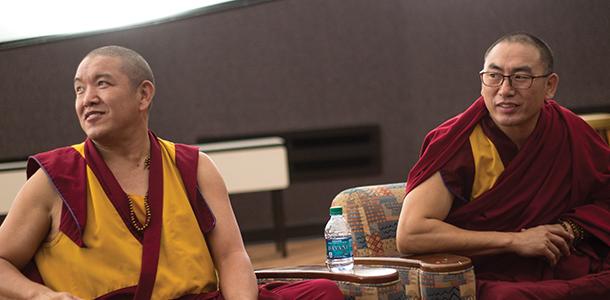Monks speak on benefits of meditation
Buddhist Tibetan monks Geshe Gelek and Geshe Sangpo listen to questions from the audience in Joseph M. Bryan Jr. Auditorium.
“Your mind is like an elephant,” said Geshe Gelek Chodha. “It is very powerful and is always on the move.”
On Nov. 9, Chodha, a Tibetan Buddhist from Raleigh’s Kadampa Center, gave a presentation on proper meditation at Joseph M. Bryan Jr. Auditorium.
“Mindfulness is like a rope,” he continued. “By being aware of our thought, we can tie its energy to an object and bring the elephant back.”
Geshe Gelek Chodha was born in 1968 in Sikkim, India. At the age of 7, he began a life of monasticism at Sera Jey Monastic University, eventually earning the degree of Geshe Lharampa, similar to a Ph.D. in the field.
The monk is a practitioner of Gelug, a prominent and relatively new school of Tibetan Buddhism. His recent talk focused on Samatha, a simple type of meditation.
Like any good teacher, Chodha began his lecture by addressing the fundamental idea of the practice.
“Meditation is designed to help us,” said Chodha. “We can use deep thinking to calm and control the mind, and to make us peaceful.”
He then transitioned into the function of concentration. In short, Chodha explained that by focusing on an object in your head, energy can be spread into various channels inside the body.
“The body contains thousands of channels through which life force and vital energies flow,” said Associate Professor of Religious Studies Eric Mortensen in an email interview.
“The channels wrap around each other at various nodes along the main meridian of the torso and head. One goal of yogic practice is to loosen the knotted channels, thus freeing the forces that flow through them.”
According to Chodha, the key to concentration is correct breathing and posture.
“Make sure your back is straight,” he said. “When your back is straight, then your channels are straight. When your channels are straight, energy can travel smoothly.”
To explain proper breathing, Gelek let the audience mimic his movements. With his left hand, he covered his left nostril and deeply inhaled. With the same hand, he then shut his right nostril and deeply exhaled.
The Geshe proceeded to present an anecdote describing the effects of concentration on the body.
“When I was 16, my friend and I went through an empty cornfield to get to a small nearby town, to watch movies,” said Chodha. “After we finished, we ran back (to make evening classes on time). When I looked at my feet, I had many cuts. But because I was so concentrated on getting back to the monastery on time, I did not even feel them.”
The remainder of the talk featured various intricacies of concentration and keeping one’s thoughts positive.
“We do so much for our bodies,” said Chodha. “We exercise, eat healthy and take supplements to make sure our bodies are fit. I think it’s about time we do something for our minds.”
Indeed, many people who practice meditation seem to achieve great results.
“I found meditation to be an amazing tool assisting my yoga practice,” said sophomore Laura Sippel in an email interview. “Ultimately (it is) a relaxing agent that calms the mind, allowing me to ground down into the real intention of yoga: developing awareness and mindfulness.”
If you are interested in Buddhist meditation, everyone is invited to the Guilford Buddhist Fellowship’s weekly meditation meetings in the Hut at 9:00 p.m. on Wednesdays.










